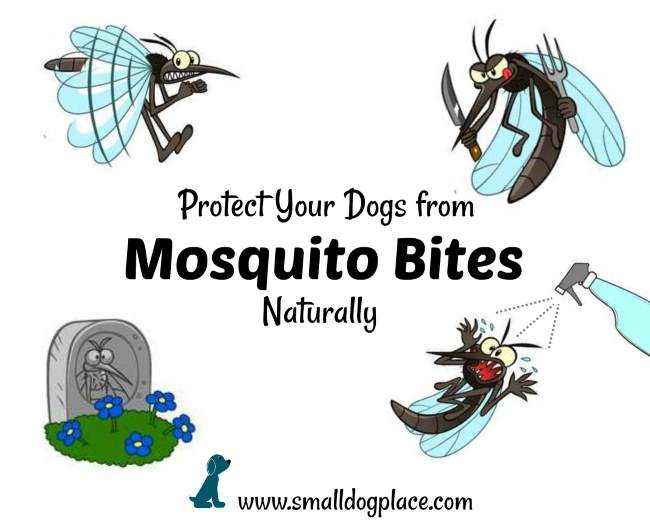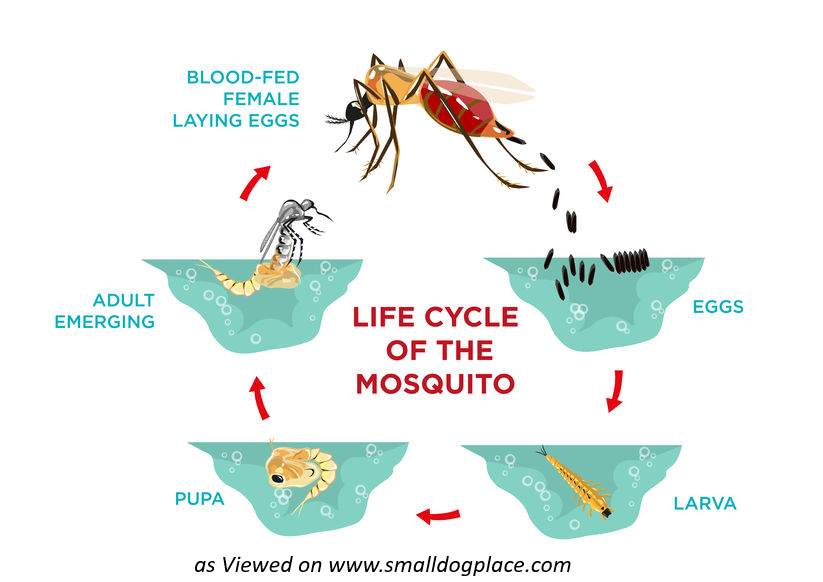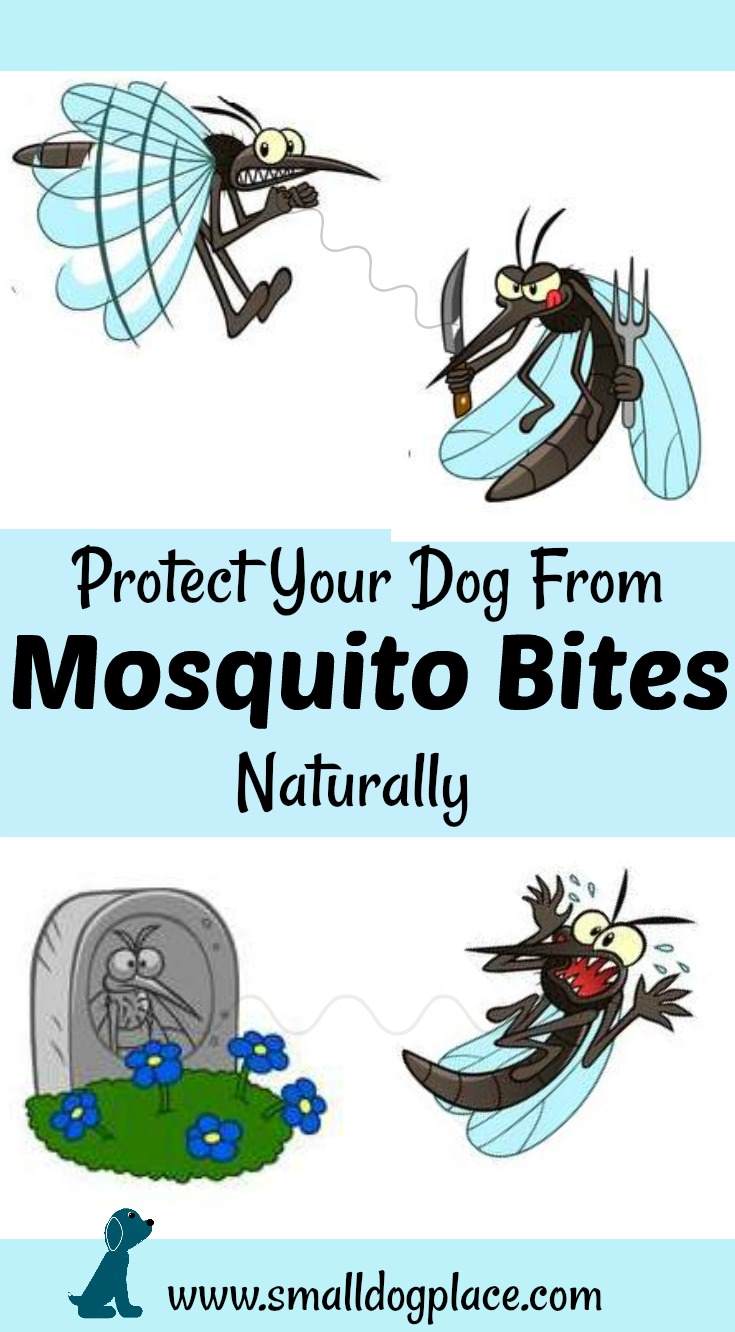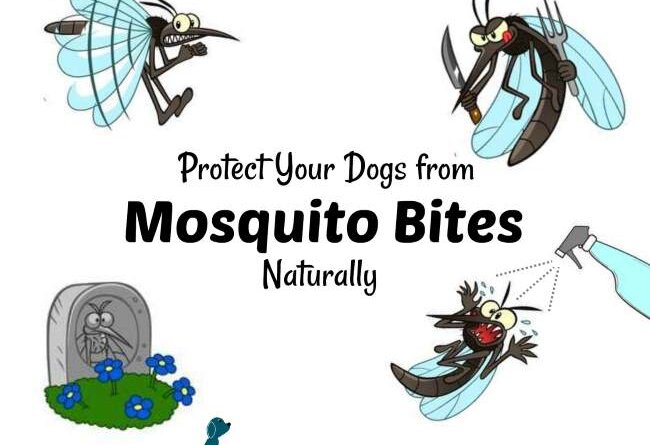Mosquito Bites on Dogs: Dangers and Prevention Tips
Mosquito Bites on Dogs by Karen Thompson Updated: 04-11-2023
Mosquitoes
are extremely active during spring and summer. And, since they are not
only extremely aggravating but also can transmit diseases with some
serious health risks, we have to make sure that we protect ourselves
from these pesky insects.
 Mosquito Bites on Dogs
Mosquito Bites on DogsBut, humans are not the only mosquito targets, they bite animals, too.
If we have the means and abilities to keep ourselves safe from
mosquitoes, animals don’t have that luxury, which means that we are
responsible for providing mosquito protection to our pets.
Why Worry About Mosquito Bites?
What’s a little mosquito bite? It stays red and itches for awhile
and then goes away. It ‘d be good if that were all there is to it, but
there is more cause for concern.
For most people, a little bite
causes a minimal loss of blood, but the saliva of the mosquito is what
is responsible for the itchy rash that often develops. The real problem
occurs because many of the species of mosquitoes carry diseases.
With a
bite, they can infect people with deadly diseases such as Malaria,
Chikungunya, Yellow Fever, West Nile Virus, Dengue Fever, and Zika.
American Mosquito Control Association (AMCA) has more information on
human diseases, if interested.
These diseases may all seem like tropical diseases, but as we have seen
with Zika, these conditions are slowly making their way into more
temperate regions due to global warming.
What Does this Mean for Our Dogs?
Dogs don’t get many of the mosquito-borne diseases that affect
people, but they can be infected with West Nile virus but normally do
not develop clinical symptoms.
The most common disease that affects
dogs (and cats too) is heartworm disease. We can control this disease
through yearly heartworm tests and placing dogs on a regiment of
heartworm preventative.
The risk of heartworm is greatest in the
summer months in northern latitudes, but in the U.S. south, mosquitos
are active all year long. Your vet will let you know how long you must
give heartworm medication and advise you to which product works best.
Even if your dog does not get a disease from a mosquito bite, they can
still experience the same itching and irritation that people feel. Dogs
can get bitten anywhere on their body, but the majority of bites occur
around areas where there is little or no hair such as ears, nose, and
paw pads.
Constant scratching, redness or red welts similar to those of
humans all happen to dogs as well. Typically mosquito bites on dogs are
not treated, but if the dog is visually miserable, your vet may be able
to prescribe something for the itching. If you can see the bite, you
can apply a small amount of Benadryl cream on the bite.

Protecting Our Dogs and Us from Mosquitoes
It is important to protect both and your pets from coming into
contact with these insect vectors. We rely on repellents and creating a
mosquito-free environment to keep us well.
Of course, nowadays,
there are many mosquito repellents available, many of which are designed
specifically for animals. However, most of the store-bought repellent
products contain chemical ingredients such as DEET, which still isn’t
the best neither for our pets or the environment.
So let’s see what the
natural alternatives to keeping your pet mosquito bite-free are.
Mosquito Bites on Dogs: Prevention
Homemade Mosquito Repellents
Firstly, you can create your own pet insect repellent using either
lemon, garlic or a blend of different essential oils as mosquitoes are
deterred by the sharp smell of these ingredients.
Just make sure that
if you use essential oils, that they can be used safely on the type of
animals you have. Lemon Eucalyptus, Tea tree oil, and Lavender are
three essential oils that will repel mosquitoes and are safe to use on
dogs.
Tea Tree Oil
One tsp per 1 cup of water.
Mix and
pour into a spray bottle. Spray on your dog.
This will also protect
them from other insects such as fleas.
If you prefer already mixed products, these can be purchased on Amazon and work safely and effectively on dogs.
Avoid Peak Hours
There are specific times of the day when mosquitoes are the most active. They are the hours of the day when the sun isn’t out yet or has gone down already, but it is still warm enough for mosquitoes to begin their attacks, so the early morning hours and late afternoons.
Therefore, don’t take your pet out for a walk and don’t let them out in the backyard during these times, as there is going to be a significantly larger amount of mosquitoes around to bite your dog or cat.
But if that isn’t possible, make sure that both you and your pet has some form of mosquito protection on, so you can repel at least some mosquitoes.
Keep your Backyard Clean
Mosquitoes hide from the summer heat
in the grass and compost. So keeping your backyard clean and grass cut
is also a good way how to protect your yard from various insects,
minimize the number of mosquitoes in your outdoor space, and help your
pets avoid mosquito bites.
On top of that, by eliminating mosquito
hiding spots, you will also make your yard less favorable to the
insects, and you might even see a decrease in a number of mosquitoes
that live in your garden.
Get Rid of All Standing Water
Since mosquitoes breed only in
standing water, there is going to be a significantly larger amount of
mosquitoes wherever there is stagnant water around.
So, again, by
eliminating every and any still water from your backyard as well as
getting rid of all water accumulating containers and spots, you can
drastically minimize mosquito numbers, which, in return, will help to
keep your pet safe from mosquitoes.
Introduce Mosquito Screens
Also, it is a good idea to make
your home a refuge from insects for your pets, because this way they
will know that at least indoors they won’t be bothered by mosquitoes.
You can do that by introducing window and door screens and mosquito
nets, which will keep mosquitoes from coming into your house and will
help turn the inside of your home into a mosquito-free zone.
If you use a doggie door, assure that when not in use, it provides sealed protection from the outdoors.
Mosquito Repellent Plants
Lastly, there are many plants
which are natural mosquito repellents and therefore will also keep
mosquitoes away. Among the most popular are citronella, lavender,
marigolds, peppermint, and rosemary.
You can either plant them in
your backyard, garden or even in your house on your windowsills. And
they, too, will help you fight the never-ending fight against
mosquitoes.
 Learn how to deal with mosquito bites on dogs: Tips you can use now.
Learn how to deal with mosquito bites on dogs: Tips you can use now.Karen Thompson is the owner of InsectCop.net, a mosquito control advice blog, which will help you keep the mosquitoes away from you and your loved ones. The road to a mosquito-free life isn’t easy, but it can be less hard if you know what to do.
Does This Article Deserve Your Thumbs Up?
We always appreciate your support and encouragement. Your thumbs up means so much to us. Please like this article.
If you find this page or any page on Small Dog Place Helpful, or Useful in anyway, I’d love it if you would click the small heart found on the bottom right of each page.
You can also share or bookmark this page — just click on the:

Free Monthly Newsletter
Sign Up for Our Free Newsletter and get our Free Gift to You.
my E-book, The Top 10 Mistakes People Make When Choosing a Dog (and how to avoid them)





